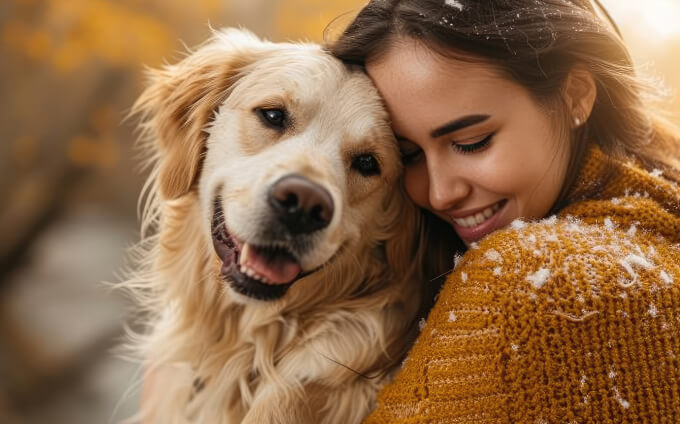- Home
- Dog Behavior
- Why Do Dogs Yawn So Much?
Why Do Dogs Yawn So Much?
Whether it's stress, empathy, or simply tiredness, each yawn has a story to tell. Lets unpack the mystery behind why dogs yawn so much.

- 21

The Basics: Why Do Dogs Yawn?
We've all seen it: our furry friends stretching their mouths wide in a big, exaggerated yawn. But what's really going on behind that adorable display? Like humans, dogs yawn for various reasons, but the meaning behind each yawn can vary greatly.
Physiological Reasons
Yawning can serve as a way to increase arousal in the nervous system, akin to the effects of caffeine. It might also help to cool the brain, especially during moments of transition, like waking up or falling asleep. This kind of yawn can often be spotted when your pup is shifting from one state of mind to another.
Emotional and Social Signals
Dogs also yawn for emotional reasons. It's a form of communication, often used to signal stress or to calm themselves in uncomfortable situations. If your dog yawns at the vet, during a thunderstorm, or when meeting new dogs, they might be feeling anxious.
Yawning as a Social Tool
Yawning isn't just about regulating physical states; it's also a powerful social signal. Dogs often yawn in response to their owners or other dogs yawning. This is known as contagious yawning and is believed to be a sign of empathy and social bonding. If you notice your dog yawning after you do, it's a heartwarming indicator of your strong bond.
Building Bonds
Contagious yawning has been observed more frequently between dogs and their owners or familiar dogs, suggesting that it helps to strengthen social connections. This behavior is thought to be a result of domestication and the deep social ties dogs form with their human families.
Stress, Anxiety, and Frustration
Stress and anxiety are major reasons behind frequent yawning. If your dog is in a stressful situation, such as being at the vet or hearing loud noises, they might yawn excessively to try to calm themselves down. This is similar to how humans might take deep breaths to relax. Additionally, dogs might yawn when they're feeling frustrated, such as when they can't solve a problem or are confused during training.
Recognizing the Signs
Look for other body language cues alongside yawning to understand your dog's emotional state. Signs of stress might include lip licking, ear flattening, or tail tucking. By paying attention to these signals, you can better support your dog through stressful situations.
Yawning from Excitement
Interestingly, dogs also yawn when they're excited. This might seem counterintuitive, but it's their way of dealing with overwhelming emotions. If you see your dog yawning when you pick up the leash or before playtime, they're likely just really excited about what's to come.
Managing Excitement
- Provide a calm environment to help your dog manage their excitement levels.
- Introduce calming activities such as gentle petting or a quiet place to relax.
Medical Concerns
While yawning is usually normal, excessive yawning can sometimes indicate an underlying health issue. Conditions such as respiratory problems, pain, or even certain medications can lead to increased yawning. If your dog's yawning is accompanied by other symptoms like coughing, lethargy, or changes in appetite, it's best to consult a vet.
When to Seek Help
If you notice that your dog's yawning seems excessive or unusual, take note of any other signs of discomfort or illness. Documenting these behaviors and discussing them with your veterinarian can help diagnose any potential health issues early.
Understanding Your Dog's Yawns
Every yawn tells a story. By paying close attention to the context and accompanying body language, you can gain valuable insights into your dog's emotional and physical state. Whether it's a sign of stress, excitement, or simply empathy, understanding your dog's yawns can help you respond to their needs more effectively and strengthen your bond even further.
Responding Appropriately
- Observe your dog's behavior in different situations to identify patterns.
- Provide comfort and reassurance when you notice stress-related yawning.
- Encourage calm and relaxation through gentle petting and a soothing environment.
Frequently Asked Questions about Dogs Yawning
Why do dogs yawn so much?
Dogs yawn to release stress, calm themselves, or signal relaxation, and it's not always because they're tired.
Is yawning in dogs a sign of stress?
Yes, frequent yawning can indicate that a dog feels anxious, uncomfortable, or overwhelmed.
Do dogs yawn when they are happy?
Sometimes dogs yawn in positive situations, such as play or excitement, as a way to manage emotions.
Can dogs yawn to communicate with humans?
Yes, dogs may yawn in response to human yawns or as a calming signal to show they mean no harm.
When should I worry about my dog yawning too much?
If yawning is excessive and combined with other stress signals, it may be worth consulting a veterinarian or trainer.
- 21
 Cassandra Dalgaard
Cassandra Dalgaard
Cassandra is an energetic dog owner who loves spending time outdoors with her 4-year-old German Shepherd, Max. They can often be found hiking in the woods, where Cassandra enjoys nature and Max explores his surroundings with great curiosity. Cassandra trains Max in tracking, an activity they both find very rewarding. In the evenings they relax at home, where Cassandra often reads a book while Max lies at her feet. Cassandra also volunteers at a local dog club where she helps organize training sessions and social events for dogs and their owners. For Cassandra, Max is more than just a dog - he's her best friend and faithful companion.
-
Food & Nutrition
 The Best Foods to Boost Your Dog's Immune System
The Best Foods to Boost Your Dog's Immune SystemTo keep your dog healthy and resilient, fueling their immune system with the right foods is key. In this post, we'll cover the top nutrient-packed foods that can give your dog's immune system the support it needs, helping them fend off illness and stay energetic.
 Marcin SolgaardOct 04, 20249
Marcin SolgaardOct 04, 20249 -
Dog Behavior
 Do Dogs Dream? A Fascinating Look Into Your Dog's Sleep
Do Dogs Dream? A Fascinating Look Into Your Dog's SleepA lively, informative exploration of canine dreaming - from brainwaves and sleep stages to dream content and how to (or not to) wake a sleeping dog.
 Cassandra DalgaardSep 02, 20253
Cassandra DalgaardSep 02, 20253 -
Dog Behavior
 How to Help a Shy or Nervous Dog Build Confidence
How to Help a Shy or Nervous Dog Build ConfidenceHelping a shy or nervous dog build confidence takes time, patience, and the right techniques. With a structured approach, you can gradually encourage your dog to feel safe, secure, and ready to take on new challenges.
 Michelle TorringSep 22, 202415
Michelle TorringSep 22, 202415 -
Puppies & Young dogs
 How to Puppy-Proof Your Home: A Complete Guide
How to Puppy-Proof Your Home: A Complete GuideBringing a new puppy home is thrilling, but keeping them safe means some serious puppy-proofing. This guide covers everything from securing hazardous items to creating a puppy-friendly zone, making your home a safe haven for your curious new companion.
 Michelle TorringOct 10, 202412
Michelle TorringOct 10, 202412 -
Dog health
 How Well Can Dogs Hear?
How Well Can Dogs Hear?Dogs have an incredible sense of hearing, capable of detecting sounds that are beyond human perception. From the range of frequencies they can hear to the practical implications of their auditory prowess, let's delve into the world of canine hearing.
 Cassandra DalgaardJul 28, 202429
Cassandra DalgaardJul 28, 202429 -
Food & Nutrition
 Is Your Dog a Picky Eater? Here's How to Get Them to Eat!
Is Your Dog a Picky Eater? Here's How to Get Them to Eat!Struggling with a picky dog? Explore these methods to make mealtime enjoyable for even the fussiest pups, ensuring they get the nutrition they need.
 Marcin SolgaardMay 30, 202435
Marcin SolgaardMay 30, 202435 -
Food & Nutrition
 Dog Supplements: When and Why to Use Them
Dog Supplements: When and Why to Use ThemDog supplements can enhance your furry friend's health by filling nutritional gaps and addressing specific health issues. Learn when and why to use them.
 Michelle TorringAug 28, 202432
Michelle TorringAug 28, 202432 -
Dog health
 Common Dog Health Issues Every Pet Owner Should Know
Common Dog Health Issues Every Pet Owner Should KnowIf you have a dog, staying informed about common health issues is essential. Knowing what signs to watch for can help keep your pup happy and healthy. From allergies to arthritis, this guide covers the key dog health problems every owner should be prepared for.
 Cassandra DalgaardSep 28, 202417
Cassandra DalgaardSep 28, 202417 -
Dog health
 Which Emotions Do Dogs Actually Experience? Understanding Your Dog's Emotions
Which Emotions Do Dogs Actually Experience? Understanding Your Dog's EmotionsDogs experience a variety of basic emotions similar to those of a young child. Learn about the emotions your dog truly feels, how they express them, and what it means for your relationship.
 Cassandra DalgaardJul 30, 202478
Cassandra DalgaardJul 30, 202478 -
Dog health
 Are Dogs Really Color Blind? The Truth About Canine Vision
Are Dogs Really Color Blind? The Truth About Canine VisionDiscover how dogs see the world, what colors they can perceive, and the science behind their unique vision. This blog post delves into the myth of dogs being color blind and explains their actual color perception.
 Marcin SolgaardMay 26, 202433
Marcin SolgaardMay 26, 202433










